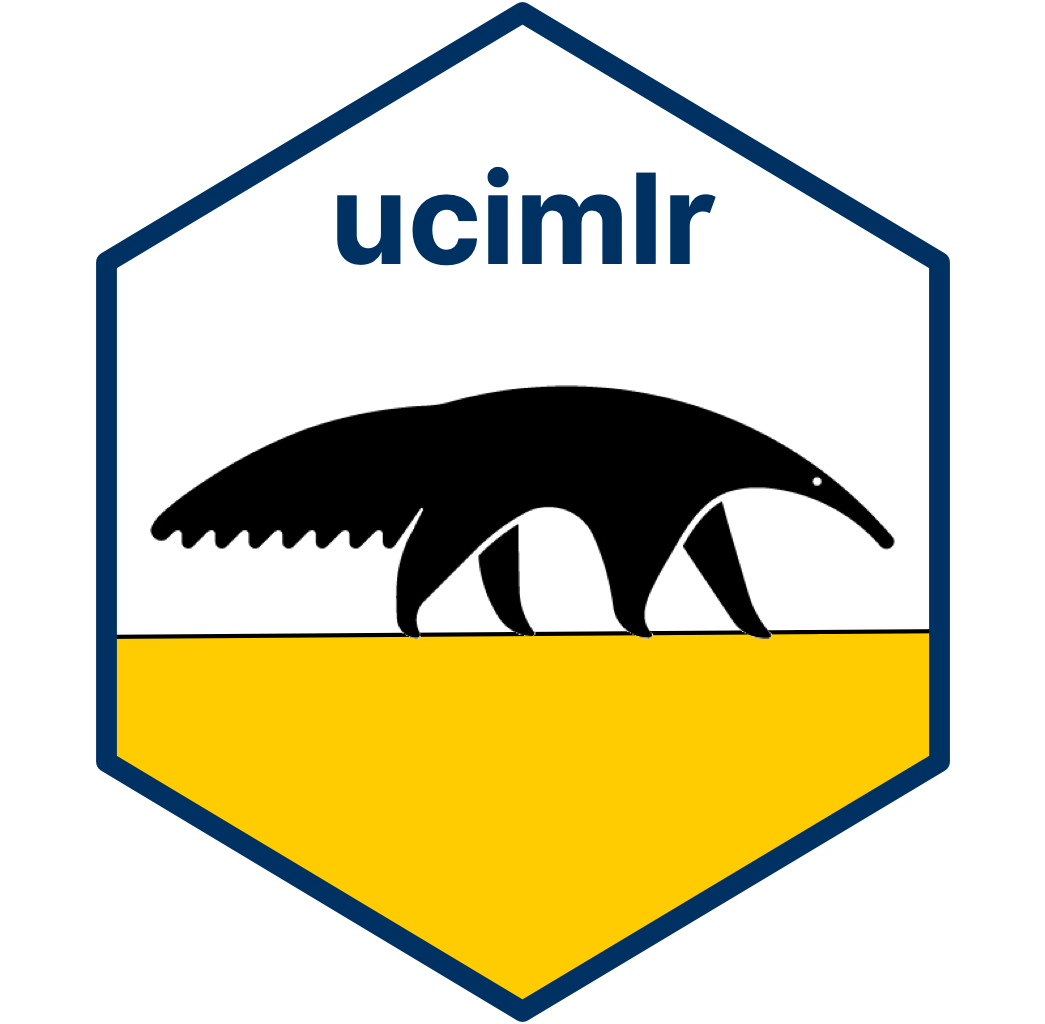The goal of ucimlr is to give R users easy access to datasets found at the University of Irvine’s Machine Learning Repository. The benefits of using this package are:
- Ease of access
- Clean data
Note that data in this repository dates back to 1987, the format across datasets are not consistent. Some inconsistencies include column separation and the way NA values are handled. Luckily, data in ucimlr follows a consistent structure that any R user can dive into. The structure is as follows:
- All variations of NA (null, blank character, ?, etc) are coded as NA
- All variables are snake case
- Everything is
stringAsFactors = FALSE - All datasets are presented as a
tibble
Note on point 3: Factors aren’t evil, but I’d rather the user decide when to code something as factor or not.
Currently, there are 559 datasets available at the official repository and 20 available in ucimlr. These numbers update every time the README.Rmd is reknit.
Installation
Keep in mind that this is a data package. As of now the package is ~2.01 MB and it will continue to grow. You can install ucimlr from GitHub with devtools:
# install.packages("devtools")
devtools::install_github("tyluRp/ucimlr")Example
We can load data by name and we can scrape the current list of datasets using the ucidata function:
library(ucimlr)
automobile
#> # A tibble: 205 x 26
#> symboling normalized_loss… make fuel_type aspiration num_of_doors body_style
#> <int> <int> <chr> <chr> <chr> <chr> <chr>
#> 1 3 NA alfa… gas std two convertib…
#> 2 3 NA alfa… gas std two convertib…
#> 3 1 NA alfa… gas std two hatchback
#> 4 2 164 audi gas std four sedan
#> 5 2 164 audi gas std four sedan
#> 6 2 NA audi gas std two sedan
#> 7 1 158 audi gas std four sedan
#> 8 1 NA audi gas std four wagon
#> 9 1 158 audi gas turbo four sedan
#> 10 0 NA audi gas turbo two hatchback
#> # … with 195 more rows, and 19 more variables: drive_wheels <chr>,
#> # engine_location <chr>, wheel_base <dbl>, length <dbl>, width <dbl>,
#> # height <dbl>, curb_weight <int>, engine_type <chr>, num_of_cylinders <chr>,
#> # engine_size <int>, fuel_system <chr>, bore <dbl>, stroke <dbl>,
#> # compression_ratio <dbl>, horsepower <int>, peak_rpm <int>, city_mpg <int>,
#> # highway_mpg <int>, price <int>
ucidata()
#> * Scraping datasets from <https://archive.ics.uci.edu/ml/datasets.php>
#> # A tibble: 559 x 7
#> name type task variable_types observations variables year
#> <chr> <chr> <chr> <chr> <int> <int> <int>
#> 1 Abalone Multiv… Classifi… Categorical, Int… 4177 8 1995
#> 2 Adult Multiv… Classifi… Categorical, Int… 48842 14 1996
#> 3 Annealing Multiv… Classifi… Categorical, Int… 798 38 NA
#> 4 Anonymous M… <NA> Recommen… Categorical 37711 294 1998
#> 5 Arrhythmia Multiv… Classifi… Categorical, Int… 452 279 1998
#> 6 Artificial … Multiv… Classifi… Categorical, Int… 6000 7 1992
#> 7 Audiology (… Multiv… Classifi… Categorical 226 NA 1987
#> 8 Audiology (… Multiv… Classifi… Categorical 226 69 1992
#> 9 Auto MPG Multiv… Regressi… Categorical, Real 398 8 1993
#> 10 Automobile Multiv… Regressi… Categorical, Int… 205 26 1987
#> # … with 549 more rows
ucinews()
#> * Scraping news from <https://archive.ics.uci.edu/ml/index.php>
#> # A tibble: 7 x 2
#> date info
#> <date> <chr>
#> 1 2020-09-24 Welcome to the new Repository admins Dheeru Dua and Efi Karra Tani…
#> 2 2020-04-04 Welcome to the new Repository admins Kevin Bache and Moshe Lichman!
#> 3 2020-03-01 Note from donor regarding Netflix data
#> 4 2020-10-16 Two new data sets have been added.
#> 5 2020-09-14 Several data sets have been added.
#> 6 2020-03-24 New data sets have been added!
#> 7 2020-06-25 Two new data sets have been added: UJI Pen Characters, MAGIC Gamma…I’d suggest loading data using R’s :: so that you can access all exported variables without loading the package. This will prevent any namespace collisions and have an additional benefit of autopopulating all the datasets and functions (assuming you’re using RStudio). Alternatively, to see a list of all available datasets you can run: data(package = "ucimlr")
